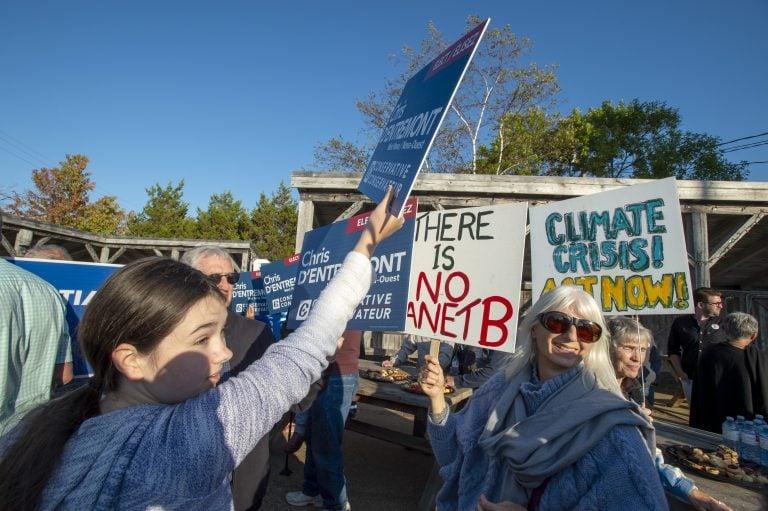To win the next election, Conservatives need a credible climate plan
Ken Boessenkool: The 905 presents a massive opportunity for the Conservative Party, if they can come up with a climate plan that reels in accessible voters

Conservative supporters try to block Climate Change signs before party leader Andrew Scheer’s arrival at a rally in Annapolis Royal, N.S., on Sept. 20, 2019. (Frank Gunn/CP)
Share
Ken Boessenkool is a Conservative activist. He has written political platforms for campaigns or leadership races in the federal Conservative Party, the B.C. Liberal Party, the Alberta Progressive Conservative Party and the Ontario Progressive Conservative Party.
If Conservatives want to win another national government they are going to have to find ways to win critical seats in the suburban belt around Toronto—the 905, encompassing cities like Ajax, Brampton and Burlington. Harper swept the 905 for his majority in 2011 and the party has been on the outs ever since.
Can Conservatives win again in the 905? They cannot count on an assist from the NDP whose vote has dropped from 25 per cent in 2011 to around 10 per cent in each subsequent election. To win, Conservatives will have to increase their vote by attracting new cohorts of voters.
In the last election, Conservatives centred their campaign around cutting taxes (eliminating the carbon tax), while the Liberals centred their campaign around climate change and cutting greenhouse gasses (sticking with their recently introduced carbon tax). The Conservatives did release a substantial document committing to reducing greenhouse gasses and outlining their approach to do so. And the Liberals platform did contain tax reductions for low- and middle-income Canadians.
Vote for us, the Conservatives said, and we’ll cut your taxes.
Vote for us, the Liberals said, and we will address climate change.
This worked wonders across western Canada, in rural Ontario, around Quebec City, and in a smattering of ridings in Atlantic Canada. But new polling for Clean Prosperity conducted by Conservative pollster Andrew Enns from Leger suggests climate change was a key reason why the Conservatives failed to gain ground in the 905.
Political strategists win elections by assembling voter coalitions big enough to win seats in enough places to win the election. All parties start the work of assembling a voter coalition by looking at what they call their accessible vote, which gives them a larger target of voters; the pool of voters that are open to voting for a party. Accessible voters are also often referred to a swing voters, which is true in one of two senses: they swing between not voting and voting, or they swing between voting for one party and another.
Political strategists use large polls, in critical ridings to understand and assess their accessible vote, so they can rely on smaller subsamples within the poll. The Clean Prosperity poll mentioned above polled over 3,000 respondents in the 905 region of Ontario. We can assess the Conservative’s accessible vote in the last election by adding together three subsamples of voters. First, people who admit to voting for a party (not uncommon for a losing party, this poll showed a slightly smaller Conservative vote in the 905, but within the typical margin of error for the sample size). Second were people who say the Conservatives were their second choice and/or admit to having voted Conservative in the past. Third were people who do not rule out voting for the Conservatives.
In the survey, Conservative voters were 31 per cent of respondents. Those who said the Conservatives were their second choice or had voted Conservative before added just over 20 per cent of respondents. An additional 17 per cent said they wouldn’t rule out voting Conservative. Thirty-one per cent of respondents said they would never vote Conservative.
When asked what was the important issue facing Canada, Conservative voters list debts and deficits, government spending, and the economy and taxes, a list not surprisingly reflecting the priorities of the Conservative campaign.
Accessible voters, on the other hand, reflect all voters: their top issue is the environment and climate change. The big gap between actual Conservative voters and potential Conservatives voters, is climate change. But did the difference affect their vote? Would a credible climate change plan from the Conservatives on climate change lead to a majority Conservative government? The poll suggests that it might.
Let’s start with the bad news. A greater emphasis on climate change by the Conservatives would cost them some of their votes: just under one in 10 Conservative voters say that a credible climate change plan from the Conservative campaign would make them “less likely” to vote Conservative. The good news, however, is that 28 per cent of accessible voters would be “more likely” to vote Conservative if the party had presented a more credible climate change plan. And most interestingly, if you look at the subsample of accessible Conservatives who didn’t rule out voting for the party, that number increases to 32 per cent of voters.
Thus, of the most accessible Conservative voters in the 905, 32 per cent would be “more likely” to vote for the party if it had a more credible climate change plan. And such a plan wouldn’t affect the vote of over 90 per cent of existing Conservative voters in the 905. This suggests that one path for the Conservative Party in the 905: to make climate change a higher priority, and to present a plan to do so.
What would such a policy look like? The federal Conservative leadership process is exiting the “registration” portion of the contest and I expect candidates will now begin telling Conservatives what their plans are on a range of issues. Winning in the 905—and the next election—may well depend on how serious they are about climate change.